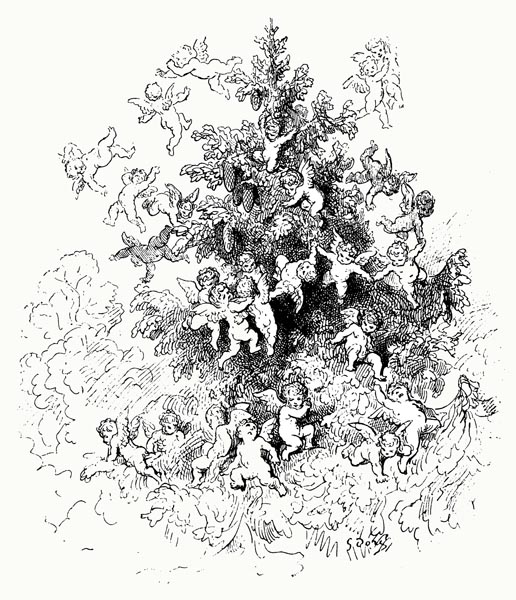Ariosto: Orlando Furioso
Canto V: The Tale of Ginevra
Translated by A. S. Kline © Copyright 2021, All Rights Reserved.
Illustrations photographed and digitally restored from the Fratelli Treves edition (Milan, 1899) by A. D. Kline.
This work may be freely reproduced, stored and transmitted, electronically or otherwise, for any non-commercial purpose.
Conditions and Exceptions apply.
Contents
- Canto V: 1-4: Ariosto condemns injustice against women
- Canto V: 5-10: The lady, Dalinda, who was Ginevra’s companion, begins her tale
- Canto V: 11-15: Her lover, Polinesso, persuades her to further his suit with Ginevra
- Canto V: 16-20: But Ginevra falls in love with Ariodante
- Canto V: 21-25: Polinesso schemes against Ginevra and Ariodante
- Canto V: 26-32: Polinesso and Ariodante agree to exchange confidences
- Canto V: 33-35: Ariodante reveals his situation
- Canto V: 36-38: Polinesso responds, with a lie
- Canto V: 39-43: Polinesso prepares to deceive Ariodante
- Canto V: 44-47: Ariodante asks Lurcanio, his brother, to stand guard
- Canto V: 48-51: Polinesso executes his plan
- Canto V: 52-55: Lurciano dissuades his brother from suicide
- Canto V: 56-59: Ariodante ultimately drowns himself
- Canto V: 60-65: Lurciano denounces Ginevra
- Canto V: 66-69: The King proclaims her innocence and seeks a champion
- Canto V: 70-74: Dalinda concludes her story to date
- Canto V: 75-78: Rinaldo arrives at St. Andrews
- Canto V: 79-84: Rinaldo seeks to halt the fight
- Canto V: 85-87: And reveals Polinesso’s deceit
- Canto V: 88-92: They fight and Polinesso is defeated
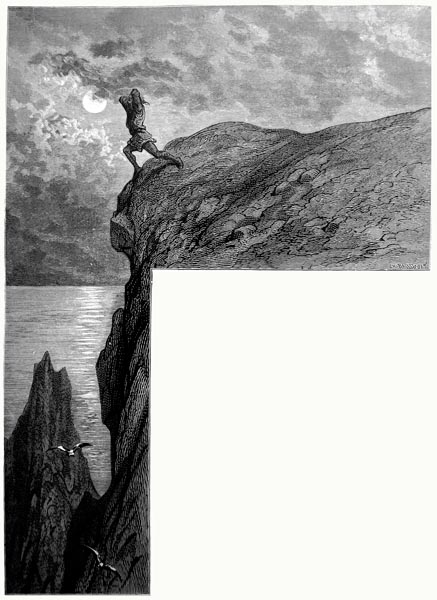
Canto V: 1-4: Ariosto condemns injustice against women
All the other creatures on this planet,
Whether they live in peace, contentedly,
Or in conflict and contention are met,
Observe this rule: treat the female fairly.
The bear to his mate will pose no threat,
The lioness meets the lion, in safety;
Beside the wolf, the she-wolf is secure,
The bull and heifer harmony ensure.
What Megaera, what infernal Fury,
Creates such trouble in the human heart?
Between man and wife, the ancient story,
Wrath and reproaches on his sorry part!
Then blows, that scarcely add to his glory,
Her woe, the marriage bed all torn apart.
And sometimes more than bitter tears are shed,
When with her blood his anger stains the bed.
Not simply a mere crime, it seems to me
His act is opposed to God and Nature,
He that a woman’s hair tears, viciously,
Or strikes a lovely maid, for his pleasure.
While he who uses poison, or would see
Her flesh robbed of the soul, its great treasure,
Should ne’er be thought a spirit, eternal,
But a demon sent from depths infernal.
And such the pair of villains must have been
That fled Rinaldo, freeing the lady,
And there, amidst the valley’s depths, unseen,
Were lost to human knowledge, completely.
I left the maid at that point in our scene
Where she was about to tell the story
Of her ills to the paladin, her friend,
A tale which I shall follow to the end.
Canto V: 5-10: The lady, Dalinda, who was Ginevra’s companion, begins her tale
The lady thus began: ‘Now, you shall hear
A tale of greater cruelty than is known
From Mycenae, Thebes, or Argos, I fear,
Or told of some more blighted royal throne.
And I believe that if the sun shines here
Less than in other regions then this zone
It scorns, or else appears unwillingly,
Lest this most savage people it should see.
Every age has shown that men will ever
Prove savage and cruel towards their foes
But to seek the death of those who’ve never
Wished us but good, a rare injustice shows.
And, that you may comprehend it better,
And know the true reason why they chose
To seek my death, I’ll tell you of this thing,
The tale complete, from its first beginning.
I’d have you know that, at a tender age,
I entered Princess Ginevra’s service,
Was raised with her and, at every stage,
Held honourable place at court for this.
But envious Love sought then to engage
My heart, and played that cruel game of his,
Such that he made the Duke of Albany
Seem fairest among lords and knights, to me.
Because he showed me more love than any,
Him was I moved to love, with all my heart.
Yet the adage is true: the face we see,
But to judge what’s within we lack the art.
Trusting in him, loving amorously,
I ceased not till, in bed, I played my part;
Careless that it was in that room ever
Retained as Ginevra’s private chamber.
There, she kept all that occupied her care,
And there, indeed, many a time would sleep.
From it, a balcony hung, in mid-air,
As out the very wall it seemed to leap.
My lover, he would climb to seek me there,
For up a ladder made of rope he’d creep,
That I’d let down from that high balcony,
Whenever I wished him to lie with me.
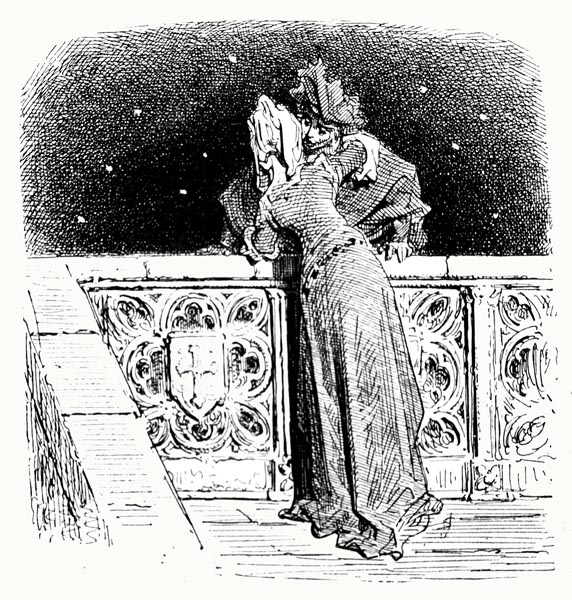
And many a time I’d request his presence,
For Ginevra would often sleep elsewhere,
Due to the heat or chill, and her absence
Left me but to release that hempen stair;
And none learned of our tryst for, in essence,
That part of the palace overlooked a bare
And empty scene of half-ruined buildings,
Whence none did view, night or day, our meetings.
Canto V: 11-15: Her lover, Polinesso, persuades her to further his suit with Ginevra
So, we continued our amorous game,
And saw each other often, night and day,
For many a month, while I felt the flame
Of deepening love, a fire within, alway.
Yet I was blind, for he knew not the same,
Loving but little, leading me astray.
Until all his deception was revealed,
By certain signs, ones not be concealed.
He disclosed that he was now the suitor
Of our Princess Ginevra. I know not
Whether this began before or after
He had won my heart; such was my lot,
And judge how powerfully this lover
Now commanded that heart, all shame forgot,
For he revealed much, and blushed not at all,
But sought my aid; I wrought my own downfall.
Tis true he claimed his love for her was less,
And that it was no true love he bore her,
Yet by simulating amorousness,
He’d every hope of wedding her thereafter.
Gladly would the king their union bless,
If such were requested by his daughter;
For none, by blood or rank, was more worthy,
In all the kingdom, of that noble lady.
He persuaded me that if, by my aid,
It was so, and he the king’s son-in-law,
(Surely, I saw his fortune must be made,
Since no man would rank higher, he was sure)
The merit would be mine, and never fade,
For he’d recall my deed for evermore;
And above his wife, and every other,
He would cherish me, and be my lover.
I, intent on pleasing him entirely,
I, never seeking to oppose his wish,
Being content in his presence solely,
Seized the opportunity, with relish,
To speak of him, sing his praises, loudly,
And so, achieve his object in all this,
To win, through all my efforts, and my art,
Possession of Princess Ginevra’s heart.
Canto V: 16-20: But Ginevra falls in love with Ariodante
God knows, in every way that I might,
I did what I could to achieve his aim,
But with Ginevra naught would go aright,
Nor could I further, thus, my lover’s claim;
For all her thoughts and wishes did alight,
Every fond feeling that you might name,
Upon a noble, fair, and courteous lord,
That was visiting Scotland, from abroad.
He came, with his young brother to our court,
From Italy, and such was his command
Of weapons and jousting that it was thought
None was his equal throughout all the land.
The king loved him, and great reward it brought,
For he granted him, with generous hand,
Towns and castles, rendering him the peer
Of the greatest and richest barons here.
Ariodante was this fair knight’s name,
Dear to the king, dearer to the daughter,
Who held a great opinion of that same,
Though more because she knew that he loved her.
Not Vesuvius, nor Aetna’s fire and flame,
Nor ruined Troy, alight, e’er burned brighter
Than did his love for her, she realised;
This Ariodante she loved and prized.
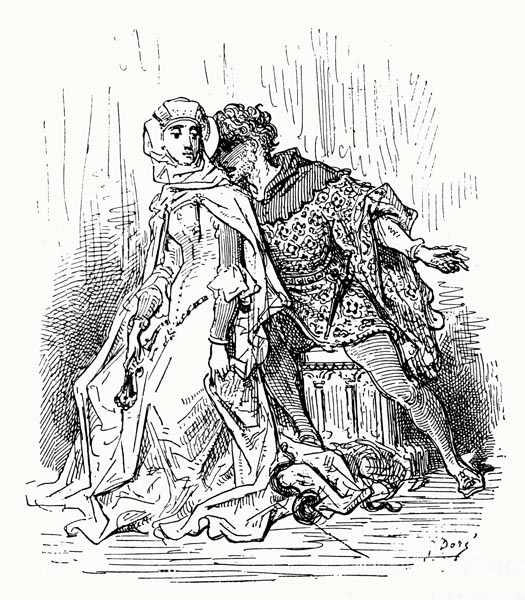
Now, the great love that for this lord she bore
With perfect loyalty, and honest heart,
Was the true reason why she’d know no more
Of Albany, nor the least hope impart.
If I, for him, a hearing did implore,
Or sought in any way to take his part,
The more antagonistic she became,
The less she wished to hear my lover’s name.
Often, I would console him, and would say
That he should quit so vain an enterprise,
Nor hope to change her mind in any way
Since another seemed fairer to her eyes;
And that to me it was as clear as day
That such flames within her heart did rise
That the western ocean’s waters, entire,
Ne’er would serve to quench so great a fire.
Canto V: 21-25: Polinesso schemes against Ginevra and Ariodante
My Polinesso, the Duke of Albany,
Hearing from me, full oft, this same sad tale,
Of how his love was disdained completely,
Realised my efforts seemed bound to fail.
Not a trace of love for her did I now see,
But finding the other suitor might prevail,
Polinesso, whose pride could but suffer,
Turned now from love to hatred and anger.
Between Ginevra and her love, he sought
To sow such conflict and such true discord
That they would never reconcile, so fraught
Would be those two, with enmity their lord;
For such shame on Ginevra would be brought
Nor life nor death could then relief afford.
With me he spoke not of this ill design,
Following his own counsel, and not mine.
Deciding, ‘My Dalinda,’ thus, he cried,
(Dalinda is indeed my name) ‘you know
That from a single root, if one’s denied
Some two, or four, or six new shoots will grow.
So too, in this, the wish may still abide,
Though robbed of all success, and thwarted so.
Things ever seek to flourish; what aspires,
Will ever strive to gain what it desires.
Nor do I crave her for herself; the pleasure
Is but in hoping that one’s plan succeeds,
And if not now effected, still, at leisure,
I may yet contemplate the joy it breeds.
And so, when I come to you, my treasure,
Dress in the clothing she no longer needs
When naked in her bed, all she sets by,
That you may seem as she does to the eye.
Study and imitate her style, her hair,
Do everything you can to look the same,
Then, from the balcony, let down the stair,
That I may climb, and so my love may claim.
I shall imagine, thus, that she is there,
Since both will seem alike, in this our game,
And so, I hope, through this but slight deceit,
To quench my passion, and contentment greet.’
Canto V: 26-32: Polinesso and Ariodante agree to exchange confidences
Those were his words. And I who was beguiled,
And not myself, failed to appreciate
This this design he preached, as to a child,
Was the concoction of a reprobate;
And so, I lowered the ladder, reconciled
To all he wished, and thus was dressed to bait
His snare, dressed as Ginevra, not seeing
The harm that I might do, in so agreeing.
Meanwhile the Duke had sought conversation
With Ariodante (for they had been friends
Before my Duke of Albany’s fixation
On Ginevra). He spoke to serve his ends:
‘How slight it seems, the remuneration
I earn from you, yet my affection bends
Towards you ever, one whom I respect
More than many another should expect.
I’m sure you’re aware of the love of old
That holds between myself and Ginevra,
Whom in lawful marriage I would enfold,
Claiming her hand from my lord and master.
Why cause us trouble now? Why so bold
As to seek a heart that’s bound forever?
I would respect your case, and not repine,
If I were in your place, and you in mine.’
‘And I,’ said Ariodante, ‘can but wonder,
At you who seem quite unaware that I
Was her true beloved ere you ever
Knew of the lady, or she caught your eye.
I swear the love between us could never
Be more ardent, and she would testify
That for myself alone she’ll say “I do.”
While, certainly, she has no love for you.
Why have you not the same respect for me,
In the cause of friendship, that you demand,
Which I would show for you, assuredly,
If, indeed, her love was yours to command?
Tis I who expect to wed her shortly,
And though you may have greater wealth to hand,
The king favours me, as events will prove,
And unlike you, I now possess her love.’
‘Ah,’ the Duke replied, ‘how great the error
To which this mad love of yours has led you!
You think she longs for you, and no other,
And I believe the same; both can’t be true!
To me your whole affair you shall discover,
While I shall reveal all mine to your view,
And let him who has the worst of it, yield,
Go seek for love elsewhere, and quit the field.
And I’m prepared, if you would have me swear
That I’ll say naught of aught you might reveal,
To do so, if you’ll pledge, in this affair,
That whate’er I may say you will conceal.’
They came to an agreement, then and there,
And on the Bible, next, their pact did seal.
Granted that vow of silence each did seek,
Ariodante was the first to speak.
Canto V: 33-35: Ariodante reveals his situation
He now explained, plainly and openly,
How the thing stood regarding Ginevra.
In speech and writing, she had sworn that she
Would never be married to another,
And, if the king objected, she would be
One who refused marriage ever after,
For she would be no other suitor’s wife,
And single would remain, all of her life.
Then he hoped he had shown by his valour,
Which many a time he had demonstrated,
His true worth, for by his fame and honour
That of the king was also elevated,
Such that now his king would show him favour,
And the marriage then be consecrated,
Pleasing his daughter who would be content,
Since to be his wife alone was her intent.
He concluded: ‘This is my state entire;
Nor to this bliss is any man as near.
No further sign do I seek or desire,
Of her love for me, which is proven clear;
I ask only that naught else transpire
But what God grants to lawful marriage here;
Aught else would prove in vain, for this I know,
That she is pure as is the driven snow.’
Canto V: 36-38: Polinesso responds, with a lie
Once Ariodante had, truthfully,
Disclosed all he wished for and hoped to win,
Polinesso, who planned that enmity
Would soon replace their love, did thus begin:
‘Your hopes are far behind mine, certainly,
For you shall witness the fair state I’m in,
And, having seen the reason for my bliss,
Confess mine the sole happiness in this.
She feigns; she neither loves nor prizes you,
That nurtures you on words and hope alone;
And more than that she mocks your folly too,
When she and I converse, unseen, unknown.
In her I trust; no promises pursue,
Nor harbour those fond hopes to which you own.
All these things I tell you, in privacy,
Which were best but thought on, silently.
Not a month goes by, but some three or four,
Or even six or ten times I will find
Myself in her embrace, naked once more,
Whose joy adds to love’s ardour, to my mind.
And you may prove it so, and thus be sure.
Vain are the hopes on which you have dined.
Seek another, yield her gracefully,
Accept that you must grant me victory.’
Canto V: 39-43: Polinesso prepares to deceive Ariodante
‘I’ll not believe it so,’ his victim cried,
‘Tis a falsehood you but now concocted!
To turn me from my purpose, thus you lied,
In hopes that she and I shall never wed.
This slur upon her name must be denied,
Tis fitting that we take the field instead,
Not only shall I prove you, there, a liar,
But traitor, too; such now is my desire.’
The duke replied: ‘It were scarcely honest.
To seek to prove the truth of it by fighting,
When I’ve offered to make all manifest
To your eyes, whenever that is pleasing.’
Ariodante troubled, now confessed
To a chill within that set him trembling,
And if he had believed all that was said,
The very soul from out his breast had fled.
With faltering heart, and with a pallid face,
With shaken voice, mouth full of bitter gall,
He answered: ‘Prove deceit to be the case,
And show me that upon her, thus, you call,
And I’ll cease to pursue one that shows grace
To you it seems, and none to me at all.
But I’ll not cease to hold your tale but lies,
If first I see it not with my own eyes.’
‘I shall advise you when the time is right,’
Said Polinesso, and went on his way,
For not on that, but the following night
We two would meet together, as alway.
The very next day, he approached the knight,
And set the snare, as well a villain may,
By telling him to hide in that same street
Where none passed by, and all was incomplete.
He pointed out an angle, well-concealed,
From which the balcony was yet in view.
Yet Ariodante to doubt did yield,
Thinking the duke might some foul plan pursue,
To trap him in that place, his weapon wield,
And seek to slay him there, for all he knew,
While feigning to reveal what could not be,
Proof of Ginevra’s infidelity.
Canto V: 44-47: Ariodante asks Lurcanio, his brother, to stand guard
He would take his place, but in a manner
That did not leave him open to surprise,
And if attacked, in some way or other,
Not vulnerable to harm or death, likewise,
He had a brave and level-headed brother,
Lurciano, whom the court did prize
For his prowess, and on whom he relied,
More than if ten others were at his side.
He summoned Lurciano and explained
That he would have him arm that night, and go
To the place where he’d lead him, but refrained
From telling him the cause, merely that so
A careful watch and guard might be maintained,
Some distance away, a good stone’s throw.
‘Come, if I call,’ he said, ‘but, as you love me,
Stir not otherwise; wait there, silently.’
‘Lead on, and trust in me,’ came the answer.
Ariodante brought them there apace,
In silence, and, stationing his brother,
Opposite the balcony took his place.
Polinesso came there from the other
Direction, ready now to bring disgrace
Upon Ginevra, and called up to me,
Caught up in his design, unknowingly.
For I, in a white dress trimmed with gold,
And with gold all spangled, and my hair
Caught up in a golden net, as of old
Was ever Ginevra’s way, I walked there,
Feigning all her manner as I’d been told,
Upon that balcony, high in the air,
That was so fashioned, being deep and wide,
That I might be seen from every side.
Canto V: 48-51: Polinesso executes his plan
Lurciano, meanwhile, left in some doubt
As to whether the other was in danger,
And wondering what it was all about,
Was tempted to spy upon his brother,
And so, he followed him to his lookout,
Keeping to the shadows as his cover,
And to the same location thus did glide,
And hid there not ten paces from his side.
I, knowing naught of this, dressed as I said,
Walked on the balcony, as times before
I’d placed myself there in Ginevra’s stead,
To good effect; and since the clothes I wore
Were clearly seen (the moon was overhead)
I, clothed like her, it was the watchers saw;
In form and aspect not dissimilar,
And in visage too not so unlike her.
They were deceived, and much the more so
In that between the balcony and the place
Where the two brothers were concealed below
There lay an abundance of empty space.
So that the duke by this deceptive show
Easily deceived them; conceive the face
Of Ariodante, when, climbing there,
Polinesso reached me, by the hempen stair.
Arrived at my side, I clasped him to my breast,
Not dreaming there were any there to see,
And kissed his face, and then his lips I pressed,
As I did ever, when he came to me;
And he, with ardour, all my form caressed
More so than usual, more fervently,
Aiding his fraud, those watchers to appal,
That, placed at a distance, must yet see all.
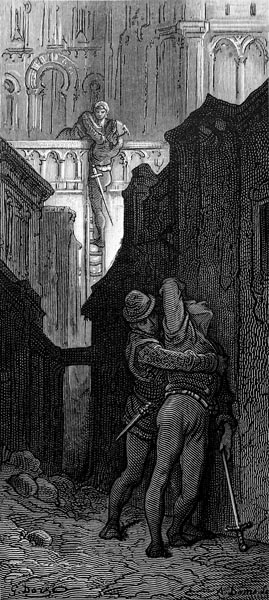
Canto V: 52-55: Lurciano dissuades his brother from suicide
Ariodante, feeling such deep despair,
That he resolved to die upon the spot,
Planted his sword hilt hard in the ground there,
To seek the death that now must prove his lot.
Lurcanio who viewed the hempen stair
With pure astonishment, though he knew not
Who ascended, seeing his brother’s deed
Rushed to prevent the act that pain decreed.
Hindering him from piercing his own breast
He thus denied the death his brother sought;
Indeed, had he not so promptly addressed
The matter all his efforts had gained naught.
‘Brother, alas, what foolishness possessed
Your mind, what madness robbed you of your thought?’
He cried: ‘To die for a mere woman so?
Treat them as mist, lost when the wind doth blow!
Seek out her death, tis fitter that she dies;
Reserve yourself for a far sweeter fate.
Twas right to love, ere you did realise,
All her deceit, and now tis right to hate.
For you have witnessed, with your own two eyes
The kind of creature that you sought as mate.
Sheathe the blade you set against your breast,
Then, before the king, her deep guilt attest.’
Ariodante, seeing his brother, there
Abandoned the deed he’d contemplated.
Yet, still intent on death, in his despair
Though his first attempt was, thus, frustrated,
He made to go, his case beyond repair,
His heart broken, his mind devastated,
While feigning to his brother that the pain,
He felt within that heart, had eased again.
Canto V: 56-59: Ariodante ultimately drowns himself
The following morn, he set out to ride,
Saying naught to his brother, all alone,
With mortal desperation for his guide;
Of him, for many a day, naught was known.
Nor did any know why he had left, aside
From his brother and Albany, I’d own;
For, in the palace, was much discussion,
And throughout the realm, as to the reason.
After eight days or so, a traveller,
With ill tidings of some fatality,
Sought out an audience with Ginevra:
Ariodante was drowned in the sea;
Not through accident or stormy weather,
For he had sought out death, willingly,
Hurling himself from a high cliff, so
As to be lost among the waves below.
‘He’d encountered myself upon the way,’
The traveller said ‘ere he acted, though,
And to the Princess asked me to relay
All that I might see of what did follow,
And explain the cause, and he did say:
“What I declare, she must already know;
In seeing all too much the reason find,
Happier were I, if I had been born blind.”
Upon a promontory there we stood,
That faces Ireland across the water,
And from that height he plunged into the flood,
And so was drowned; I hastened thereafter
To bring the news to you, though nothing good.’
Stunned and horrified, the king’s daughter
Gazed at the man, while all her colour fled,
Unmoving there, like one who seemed half-dead.
Canto V: 60-65: Lurciano denounces Ginevra
Oh, Lord, what did she not say when, alone,
On her pillow she laid her head once more,
Ripping her gown, she beat at her breastbone,
And at her golden tresses wildly tore,
Uttering his last words in saddened tone,
Those of her love, that the traveller bore,
Claiming the reason for his death had been
That all too much his tearful eyes had seen.
That he had died of grief the rumour ran,
And there were none at court who failed to weep,
The ladies full of tears, and scarce a man,
From squire to king that did not vigil keep.
With his brother, all their mourning began,
Whose overwhelming sorrow ran so deep
Against himself he well-nigh turned his blade,
As if to follow, thus, to death’s dark glade.
And many a time, to himself, he said
That Ginevra was the cause of it all,
For that ill deed it was of hers had led
To his brother’s death, to his fatal fall;
And in his mind desire for vengeance bred,
So great his grief, his anger’s bitter gall,
That he became estranged of full many,
Loathing the king’s court, and that whole country.
When the audience hall was full, indeed,
He stood before the king and made this claim,
“Your daughter’s fault, alone, this was the seed
Of my brother’s madness, she slew that same,
Addling his wits, she brought about the deed,
For the deepest woe his reason overcame,
On viewing her shameful actions, and he
Sought but to die, and end his misery.
He loved her, and that fact I will not hide,
For his love was honest; to deserve her,
By his true worth and virtue close allied,
He sought, and faithful service, no other;
For while he wished her only as his bride,
He scented the rose from afar as ever,
Yet saw another scale the secret stair,
And win the fair flower that budded there.’
Then Lurciano hastened to explain
How he had seen her on the balcony,
And how a rope-ladder, that had lain
Upon its floor, she’d let down secretly,
By which her lover might her presence gain.
The name he knew not, for he could not see
Through the disguise, yet he would prove it true,
Should any seek to challenge all he knew.
Canto V: 66-69: The King proclaims her innocence and seeks a champion
You may imagine her poor father’s grief,
On hearing that damning accusation,
A claim that, seeming far beyond belief,
Brought about his utter consternation,
Since, if none would haste to her relief,
And prove the tale a sheer fabrication,
She must then be punished for a lie,
And, lacking a brave champion, must die.
I think tis known to you, sir, that our law,
Condemns a woman here to death by fire,
Whether fair maid or lady, rich or poor,
That slakes aught else but her husband’s desire.
And she must die, unless she can procure
A champion ere a month shall expire.
He her innocence must seek to maintain,
And against her false accuser then sustain.
The king has proclaimed, throughout the country,
(To demonstrate the falseness of the claim)
That whoever saves her from this infamy
Shall wed her; a fine dowry shall that same
Champion receive; and yet none we see
Appears as yet, since Lurciano’s fame
As a knight is such, one so fierce in arms,
He is as feared in joust as war’s alarms.
And her ill fate has willed that Zerbino,
Her brother, is absent from the kingdom.
For many a month he has wandered so,
Proving his worth abroad; were he to come,
Or be so placed that he might somehow know
Of his sister’s dreadful plight, though wherefrom
I know not, his courage is such that he
Would champion her cause, then, instantly.
Canto V: 70-74: Dalinda concludes her story to date
The king meanwhile seeking to ascertain
By other means than combat, whether he,
Her accuser, speaks true, or then again
Whether he lies and she should be set free,
Has seized on several ladies in her train,
Who ought to know the facts; it seemed to me
That were I taken then the duke and I
Would find ourselves in peril, by and by.
That night I fled the palace, and the court,
And went to join my Duke of Albany,
And made him recognise the dread import
To both our lives of forced captivity.
He praised me then, and swiftly calmed my thought,
Inducing me to go, for my safety
To a castle that was his, which stood nearby,
With two men to guide me till it was nigh.
You have heard, sir, in what manner
I’d assured Polinesso of my love,
And can judge whether or not, thereafter,
He lay in debt to me, and so approve,
Or not, his care of me, for my lover
Granted me a scant reward thereof,
And bear witness whether women earn,
For loving thus, commensurate return.
For so ungrateful, cruel, and treacherous
Was he, and doubtful of my loyalty,
He thought my knowledge of him dangerous,
And that I might reveal all openly.
He feigned that the king was so furious
That I must be hidden for my safety,
And so be taken to this keep; though I,
Such was his intent, was but doomed to die.
For he had told my guides that, in the wood,
(This was his thanks for all my faithfulness)
I must be slain, and so no longer could
Disclose his plot; you witnessed my distress,
And if you’d not been in the neighbourhood,
His vile plan would have met with swift success.
See how love treats those who his laws obey!’
Such was her tale as they went on their way.
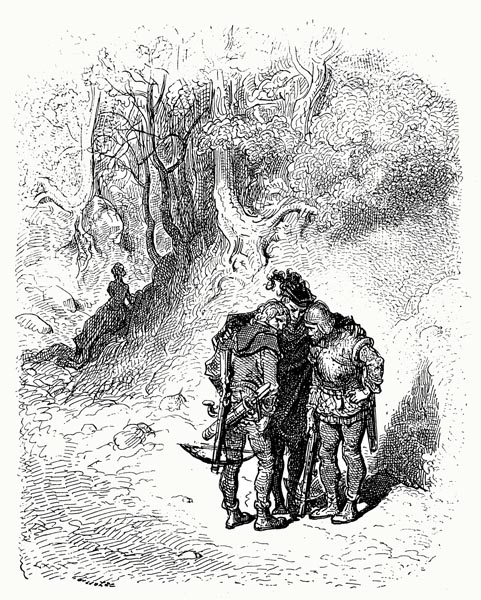
Canto V: 75-78: Rinaldo arrives at St. Andrews
Above all else, Rinaldo felt delight
At this chance that fortune had created;
His rescuing a lady, who the plight
Of the guiltless princess had related.
For while he would, as the perfect knight,
Aid her, though her guilt were demonstrated,
His happiness was greater since the fight
Would prove her total innocence outright.
So, to St. Andrews he now rode apace,
Where lay the king and all his company,
And, thus, a lawful contest could take place
Regarding the daughter’s fate. And briefly,
When short of the town but a little space,
He met a squire who spoke of the lady,
Giving him later news than had Dalinda
Concerning this matter of Ginevra.
It appeared that a knight whom none did know,
Had arrived to champion the princess;
His coat of arms was quite concealed also;
He hid his face, and none his name could guess,
Since naught that might proclaim it was on show,
Nor could they thus deduce it from his dress.
And then the very squire in his service
Declared: ‘Indeed, I know not who he is.’
In a short while, they arrived at the wall,
And then reined in their mounts before the gate.
Dalinda fearful of what might befall
If she now entered, trembled for her fate.
Rinaldo gave her comfort, then did call
To the guard stood without, demanding straight
Why all was barred; the man replied all there
Had gone to view the end of that affair.
Canto V: 79-84: Rinaldo seeks to halt the fight
For Lurciano and this unknown knight,
At a place beyond the township, were met,
And they had even now begun the fight,
Upon that field, though none had conquered yet.
He then threw wide the gate, and did invite
Montalbano’s lord to enter without threat;
Who, at last, after seeking far and wide,
Found lodgings for the lady at his side.
He said to her that he would soon return,
While she might rest, in safety, till he did,
And then towards the lists he went to learn
The outcome of this Lurciano’s bid,
And found that both there did great merit earn,
Though neither of the other was yet rid,
The one for Ginevra’s death battling still,
The other for the truth, to thwart his will.
Six armoured knights manned the palisade,
Where Polinesso mounted on a steed,
Of the finest, and in the robes arrayed,
Of high-constable, performed, as decreed,
The role of judge, and saw that they obeyed
The rules of combat; relishing, indeed,
The sight of Ginevra’s mortal peril,
With joyful heart, bold as any devil.
Rinaldo pushed onwards through the crowd,
(For Bayard’s presence was felt far and wide)
While those who saw him nearing simply bowed
And moved away, ere they were thrust aside,
Above the steed they saw the rider, proud,
And seeming as one not to be denied,
A flower of chivalry, who halted near
The king’s seat, while they gathered round, to hear.
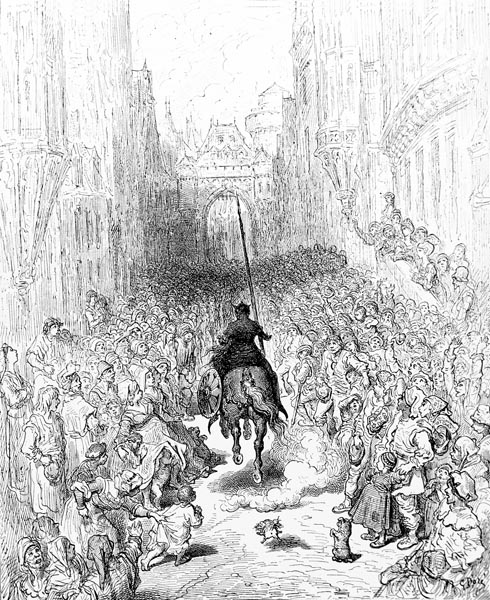
Rinaldo spoke: ‘Sire, let the contest cease
And these brave warriors so end their fight,
Since if either man dies it should displease
Any here that would command what is right.
For this lord, here, thinks tis the truth he sees,
Claims what is false, yet is a truthful knight,
Though the same error brought his brother’s death
That causes him, today, to lose his breath;
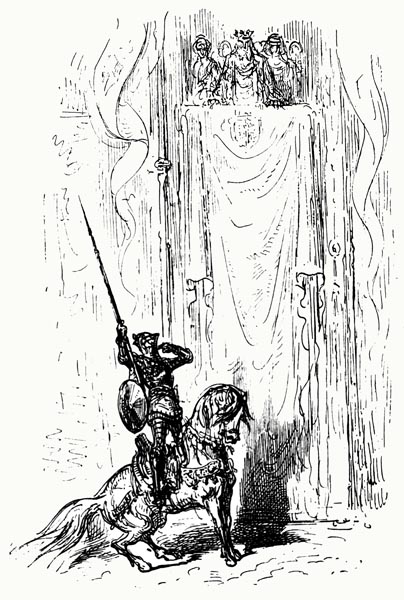
The other, of sheer kindness, plies his sword
Not knowing if the cause be right or wrong,
Because relief to her he would afford,
Your fair princess, and battles hard and long.
I bring relief to innocence, my lord,
The opposite shall to that wretch belong
That wrought the lie; but first let them forego
Their conflict, and give ear to what I know.’
Canto V: 85-87: And reveals Polinesso’s deceit
So great seemed the innate authority
Of the lord Rinaldo appeared to be,
That the king signalled, out of chivalry,
Their attacks must cease, and instantly,
To whom, and all the barons, then did he
Reveal all Polinesso’s treachery,
Explaining the plot whereby he’d sought
To bring about Ginevra’s death, in short.
Then affirmed that he now wished to prove
The truth of every word that he had said,
Calling on Polinesso, who yet did move
That naught of this was valid, all instead
Mere lies indeed, and no man could reprove
His actions: ‘Then be it on your own head!’
Cried Rinaldo; the field was made ready,
That they might now display their chivalry.
How dearly the king and his people prayed
That Ginevra would be proven innocent!
All hoped that, her guiltlessness displayed,
The outcome would condemn the duke’s intent,
Finding his character, when rightly weighed,
Proud, avaricious, cruel and fraudulent.
Such that twas no great wonder, they agreed,
That he had wrought some dark, malicious deed.
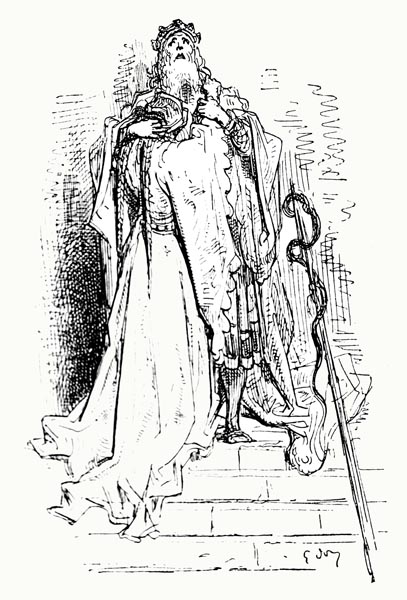
Canto V: 88-92: They fight and Polinesso is defeated
Now, Polinesso’s face had lost its colour,
Yet at the signal, levelling his lance,
His heart quaking, his cheeks full of pallor,
Against Rinaldo he did swift advance,
Who then spurred towards him, bold as ever,
To end this fight at the earliest chance.
Nor was he unhappy with the issue,
Since his brave lance half-pierced the other through.
Transfixed, the duke was toppled to the ground,
More than six yards beyond his unharmed steed.
Rinaldo reached him, and the helm unbound,
Ere he could rise, though he could but concede,
(Unable to fight on, as now he found)
Then pray for mercy, in his hour of need,
And to the king confess, with fading breath,
His vile deceit had brought about his death.
He could not finish, in mid speech he died,
For with the failing life the voice had fled.
The king had seen the wrong thus rectified,
His daughter freed, and the miscreant dead,
Her name restored, and he with joy allied,
More so than if the crown upon his head,
Being lost, had been placed upon his brow;
Such that all honour was Rinaldo’s now.
That knight free of his helm, the monarch saw
Features he knew, now openly displayed.
And thanked the Lord for helping him once more,
In sending this warrior to her aid.
The other unknown knight, who nobly bore
His lance to fight her cause, all unafraid,
Now stood apart, and gazed upon the scene,
That first Ginevra’s champion had been.
He was requested to declare his name,
Or at least, said the king, to show his face,
So that, beyond the simple gift of fame,
Reward he might receive, of royal grace.
Yielding to their pleas to reveal that same,
He made clear, for his helm he did unlace,
What I shall speak of in the next canto,
If it pleases you to hear what did follow.
The End of Canto V of ‘Orlando Furioso’
